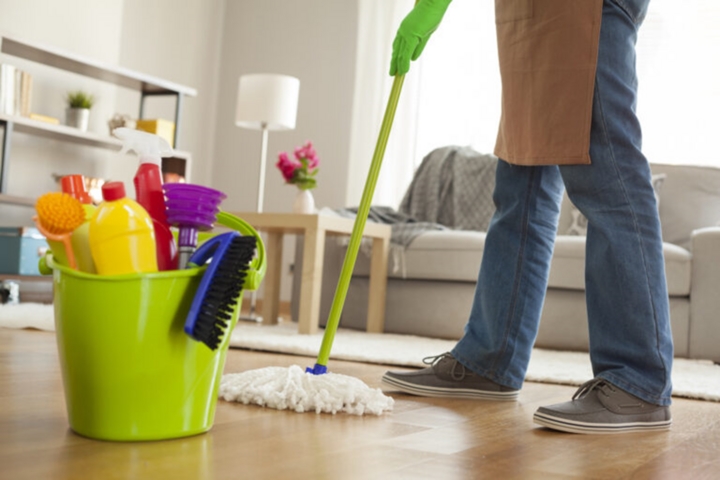Many people experience a foul odor after mopping their floors, which can be annoying and defeat the purpose of cleaning. So, why does mopping the floor leave a stinky smell?
Why Does Mopping the Floor Smell Fishy?
The fishy smell after mopping is a common issue that often leaves people puzzled. This phenomenon can stem from various reasons:
Poor Water Quality
The quality of water used for mopping is one of the primary reasons for the fishy smell. Water from different sources may contain various impurities and bacteria, resulting in an unpleasant odor when used.

Why does mopping the floor smell fishy? Water quality is a factor. (Image: Bondcleaning)
– Stagnant or old water: Using water that has been sitting for a while or not changing the water frequently during mopping can lead to dirty water with bacteria, resulting in a fishy smell.
– Unclean water source: Water from unclear sources, such as well water that hasn’t been filtered, may contain organic impurities and bacteria, leading to a foul odor.
Dirty Mopping Tools and Infrequent Water Changes
Another reason for the fishy smell is not changing the mopping water frequently enough, causing it to become dirty. When you mop, dust, bacteria, and waste accumulate in the water. If you don’t change it often, these impurities will stick to the floor and create an unpleasant smell.
Mopping tools like the mop head and cloth can become breeding grounds for bacteria and mold if not cleaned thoroughly after each use. Leaving the mop head damp for extended periods also encourages bacterial growth and a foul smell. Using these tools again will spread bacteria and the unpleasant odor onto the floor.
Using Inappropriate Cleaning Agents
Some cleaning agents can cause unpleasant odors if not used correctly. For instance, diluting cleaning agents incorrectly or using too much can leave the floor not entirely clean, resulting in a fishy smell.
Additionally, low-quality or inappropriate cleaning products may not be strong enough to eliminate odors and could even make the smell worse. Using excessive amounts of cleaning agents without proper rinsing can also leave chemical residues, causing odors.
Dirty Floor
If your floor has accumulated dust, grease, food, or other organic matter over time, inadequate cleaning can cause these substances to decompose and emit a fishy smell.
Food crumbs on the floor, if not cleaned properly, can decompose and cause a fishy odor. Grease from the kitchen, if not wiped off the floor correctly, can also contribute to the smell.
Humid Environment
A humid environment is ideal for bacterial and mold growth, leading to an unpleasant odor. If your home lacks proper ventilation, the mopped floor may not dry completely, providing the perfect conditions for bacterial and mold growth. This is especially true during the rainy season or in areas with high humidity.
Grout Between Tiles is Damp and Moldy
While tile floors themselves don’t typically emit a fishy smell, the grout between the tiles can. If the tiler uses low-quality grout during installation, it can become moldy when exposed to water over time. This mold will then emit a foul odor.
How to Get Rid of the Fishy Smell After Mopping
The fishy smell on the floor after mopping can be unpleasant and impact the quality of your living space. To address this issue, it’s essential to understand the underlying causes and implement appropriate solutions. Here are some effective ways to eliminate the fishy smell from your floor:

The fishy smell after mopping is a common issue, but it can be resolved by understanding the causes. (Image: 360precisioncleaning)
Check and Improve Water Quality
Use water from a reliable source, such as treated tap water or filtered water. Avoid using water from unclear sources or untreated well water.
To prevent the dirty mop water from causing a fishy smell, change the water frequently during cleaning. Finally, mop with clean water to ensure no dust or bacteria are left on the floor.
Clean and Maintain Mopping Tools
Ensure your mopping tools are thoroughly cleaned after each use. Wash and dry the mop head and cloth before reusing them to prevent bacterial and mold growth.
After each use, wash the mop head with hot water and disinfectant, such as vinegar, baking soda, or dish soap. Hang the mop head to dry in the sun to disinfect and prevent mold. Avoid storing the mop head in humid places like bathrooms.
If your mop head is moldy, try this: shake and rinse it, then soak it in a bucket of boiling water mixed with salt, baking soda, and dish soap for 10 minutes. Finally, rinse it with clean water and let it dry.
Use Suitable Cleaning Agents
Choose suitable cleaning agents and follow the manufacturer’s instructions for use. Avoid using excessive amounts or diluting them incorrectly to ensure your floor is thoroughly cleaned.
Rinse the floor with clean water after mopping to remove any residual cleaning agents and prevent odors.
Thoroughly Clean the Floor
Frequently mop the floor, especially in areas prone to dirt, like the kitchen and dining area, to eliminate odors. Pay extra attention to the grout between tiles; use a mold-removing gel, apply it to the grout, and wait for about three hours before wiping it off.
Natural ingredients like lemon, vinegar, and baking soda can be used to neutralize fishy smells. Lemon and vinegar have mild acidic properties that help eliminate bacteria and mold, while baking soda effectively absorbs odors.
Maintain a Well-Ventilated Environment
Ensure your living space is well-ventilated by opening windows or using fans to promote air circulation. Use a dehumidifier or air conditioner to reduce humidity levels in your home.
Avoid mopping the floor too frequently if unnecessary, especially with wooden floors, as this can make the floor damp and cause odors.
Understanding why mopping the floor can result in a fishy smell and implementing the appropriate solutions will help you maintain a clean and pleasant living environment.
According to VTC NEWS































